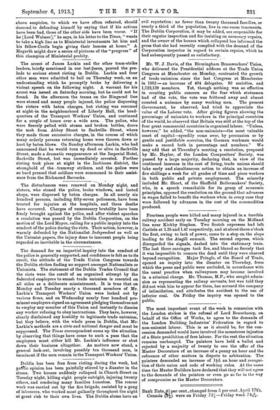The arrest of James Larkin and the other tram-strike leaders,
briefly mentioned in our last tissue, proved the pre- lude to serious street rioting in Dublin. Larkin and four other men were admitted to bail on Thursday week, on an understanding which he promptly broke by delivering a violent speech on the following night. A. warrant for his arrest was issued on Saturday morning, but he could not be found. In the afternoon the trams on the Ringsend line were stoned and many people injured, the police dispersing the rioters with baton charges, but rioting was resumed at night -in the neighbourhood of Liberty Hall, the head- quarters of the Transport Workers' Union, and continued for a couple of hours over a wide area. _ The police, who were fiercely pelted with stones and broken bottles, drove the mob from . Abbey Street to Sackville-- Street, where they made three successive charges, in the course- of which many orderly persons returning home were thrown down or hurt by baton blows. On Sunday afternoon Larkin, who had announced that he would turn up dead or alive in Sackville Street, made a dramatic reappearance at the Imperial Hotel, Sackville Street, but was immediately arrested. Further rioting took place at night in the- Inchicore district, the stronghold of the -.tramway strikers, and the-police were so hard pressed that soldiers were summoned to their assist- ance from the Richmond Barracks.






































 Previous page
Previous page